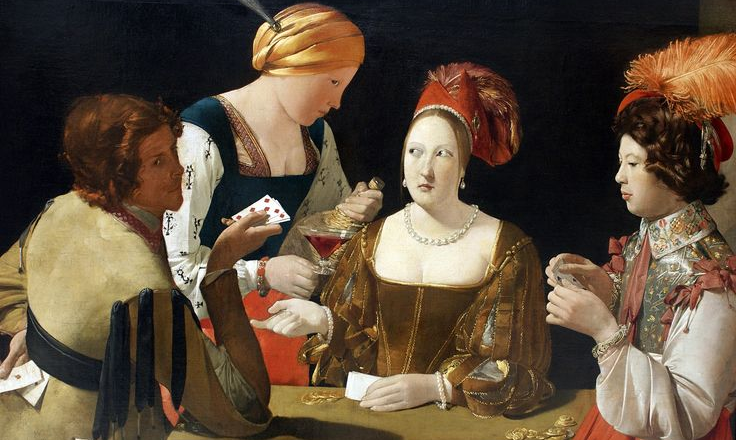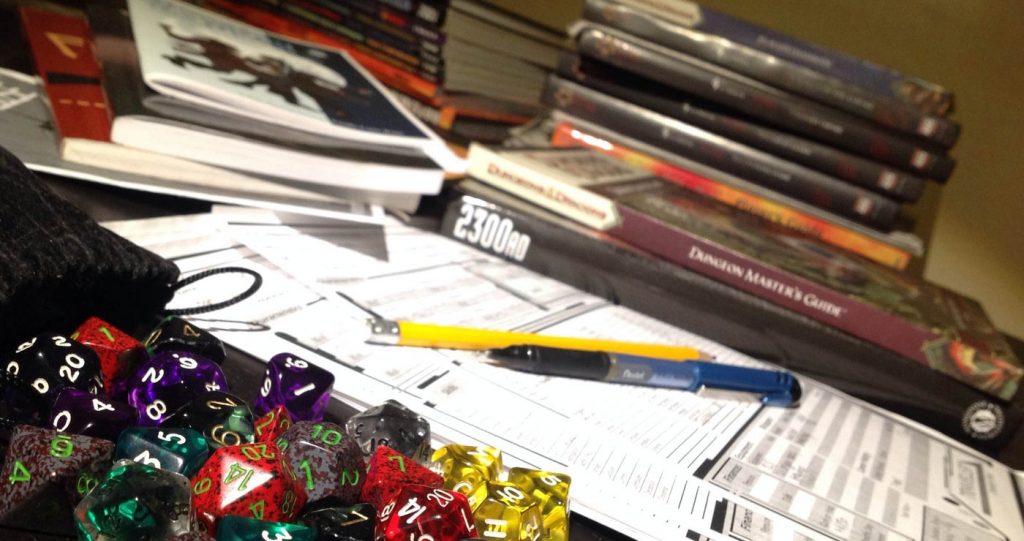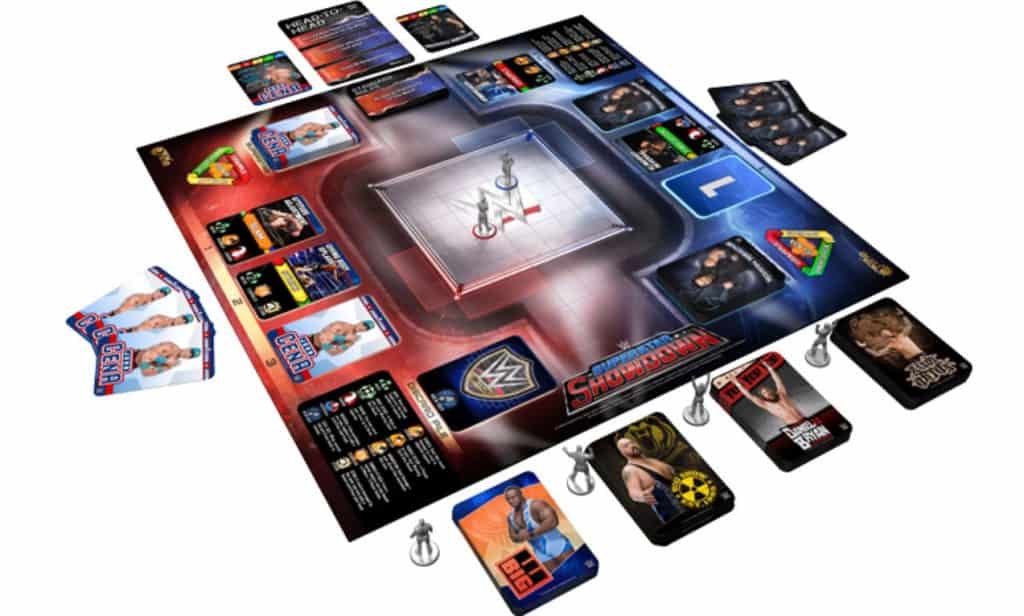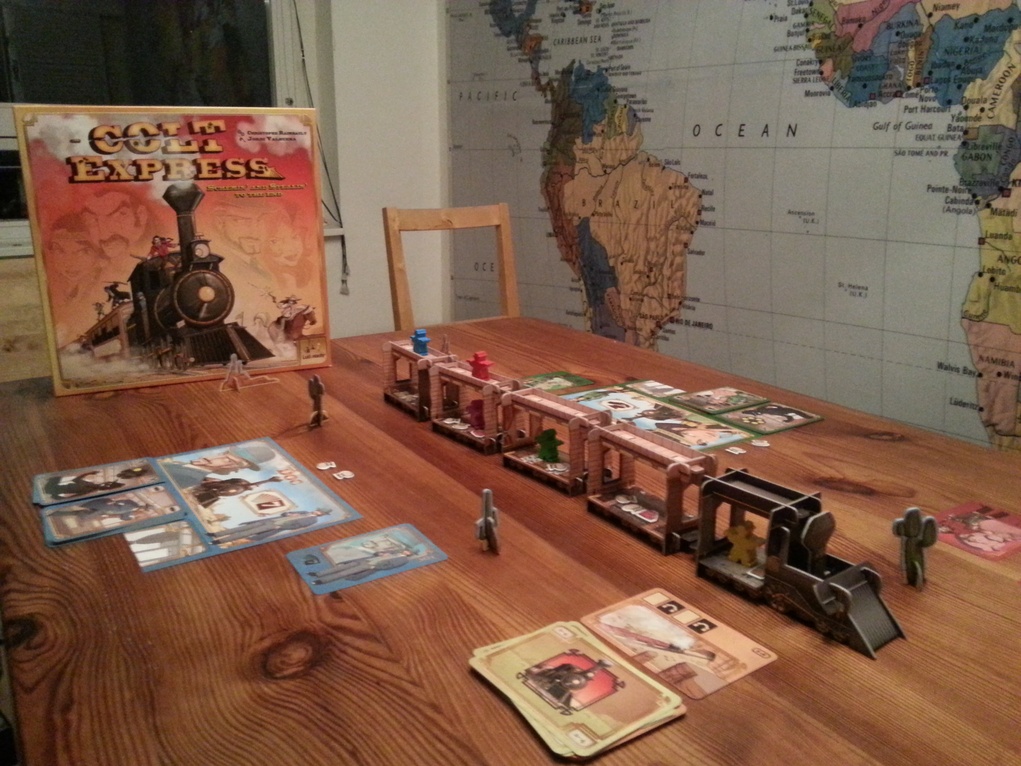Pip: My grandfather was the first person to teach me cards. My memory of exactly how I came to understand the possibilities of suits and tricks, the dual nature of aces and the hierarchy of the royal court (even though the knave would remain for many years as this weird professional tart thief who was inexplicably allowed to keep hanging out with the monarchy – perhaps by dint of being popular because of the tarts?) has faded over time. It’s in the same bracket as learning to read or write. I don’t remember a time when the shapes didn’t make sense. But I do know that it was my grandfather’s doing.
He was fond of cards in that way that doesn’t seem to be common now. My mother tells me that he had a bridge group. My grandmother would also attend, but more for my grandfather than her own amusement. Cards were also a source of entertainment and distraction during his time in Egypt in the second world war and a valuable pastime while he was a prisoner during that war.
None of this ever came into what he was sharing with me – I learned all of that far later during a phone call with my mother as I wondered whether it had just been a way of keeping me occupied during long visits. It was a relief to realise he’d enjoyed it as neither of my parents can stand card games. That’s part of why it was my grandfather who taught me; we didn’t even have a deck of cards at my parents’ house unless one sneaked past the front door as part of a Christmas cracker.
Grandad had TWO decks of cards! Imagine that! One had red backs and one had blue. The luxury! The extravagance! Both decks lived in the cupboard under the stairs on the games shelf along with Othello, Ludo and Snakes and Ladders.
I think the first game I ever learned was Beat Your Neighbour Out Of Doors. It’s also called Strip Jack Naked but that is definitely not something I learned from grandad.
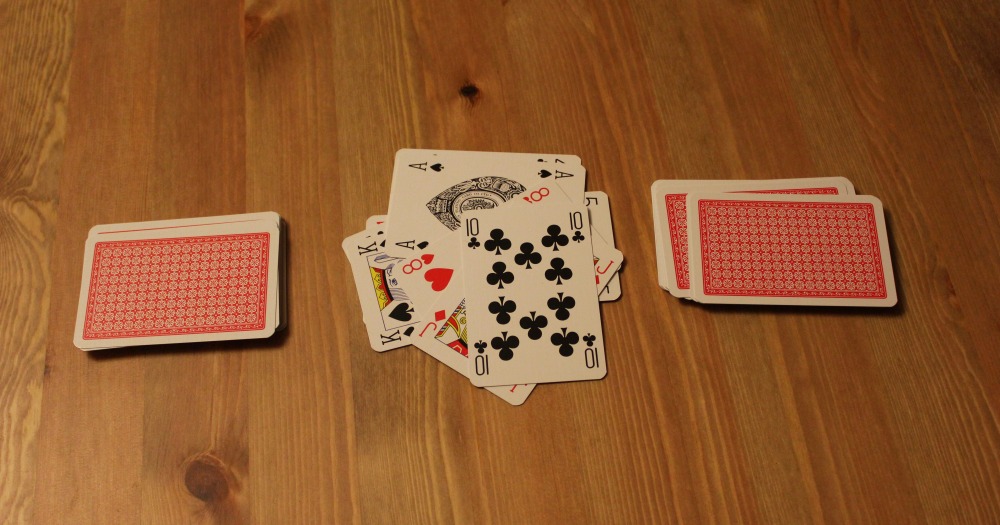
Beat Your Neighbour (which I’m now worried is offensive in some way I’ve failed to understand) involves dealing out the cards and then alternately putting them down in a big pile. If you turn over a face card the other person has to pay a set number of cards to the pile. It’s one for a jack, two for a queen, three for a king and four for an ace. If you pay they get all the cards in the pile and you start again. If you turn over a face card as part of your payment then they have to pay you. You’re trying not to lose all your cards.
There’s no skill in this whatsoever. I worked that out really early on because, given my parents hated cards and my grandad wasn’t always well, I would sometimes fail to find anyone to play with me and you can play Beat Your Neighbour alone, just watching how the cards play out. Sometimes my brother would play with me but if one of us played a jack, then the other countered it with a different face card, then another jack appeared he would shout “JACK SANDWICH” and it was one of those sibling things that inexplicably irritated me and so he did it even more exuberantly each time.
Whist and Gin Rummy were more pleasing to me. Whist introduced me to the idea of trick-taking and things like trump cards, while Gin Rummy taught me about sets and runs. It occurs to me while reading up about both that grandad either played a version of both which was slightly more forgiving than some variants, or he made it more child-friendly as he taught it, perhaps hoping to impart the finer points of something like bridge when we were a bit older. For example, we didn’t keep score when we played card games because we didn’t need to – every game only lasted one round so you either won or you lost.
When grandad wasn’t around to explain these magical rulesets which seemed to be on a par with the ten commandments – ideas which would be communicated by people but which seemed to stem from somewhere outside time, outside human creation – we would play other things. Snap was one, although it always felt less fun than with special snap decks because a spade is all well and good but a picture of a frog is brilliant and then TWO pictures of frogs is just about the most exciting thing there is. Houses of cards were another pastime, although we had to be careful not to bend or scrape the cards otherwise there would be Big Trouble.
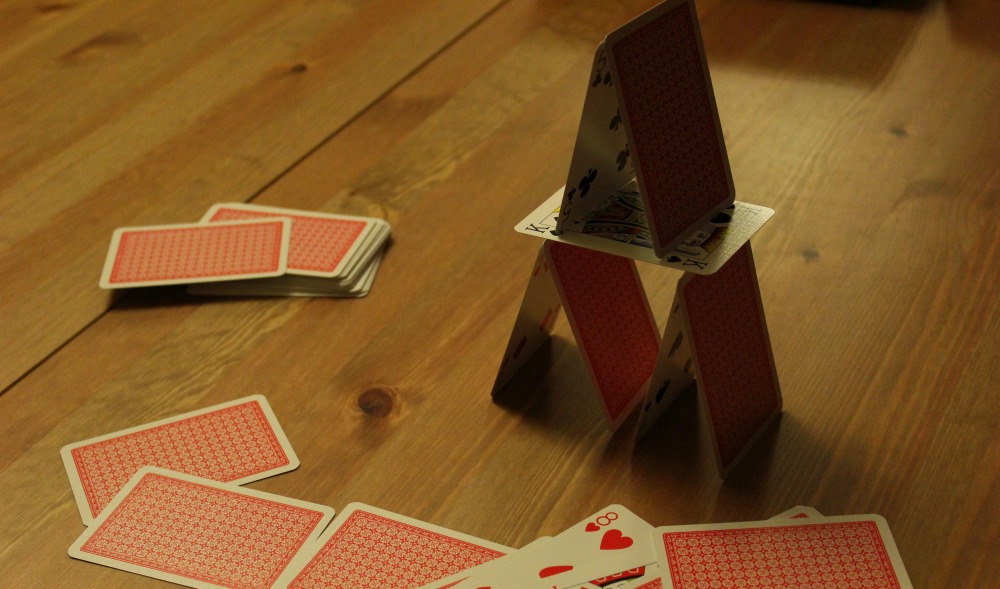
I think this is when my grandad must have taught me clock patience. Something I could play by myself when other people were busy that didn’t ruin his cards. I cheated at clock patience because it felt like such a stupid thing to do, putting yourself in an impossible situation just because of a card draw. I mean, give me Spider Solitaire and I lose any semblance of self control and have to delete it from my PC (I am not kidding) but clock patience with a physical deck of cards just feels like you’ve given up hope of anything good ever happening again because sometimes fate (in the guise of a shuffled deck) will sometimes just dick you over and that’s it. You lose. And now it’s bathtime and hometime and no, those are grandad’s cards and they live at grandad’s house. Fancy playing clock patience and not cheating, going to bathtime a loser and not a victor. No. You must ALWAYS rage against the dying of the light.
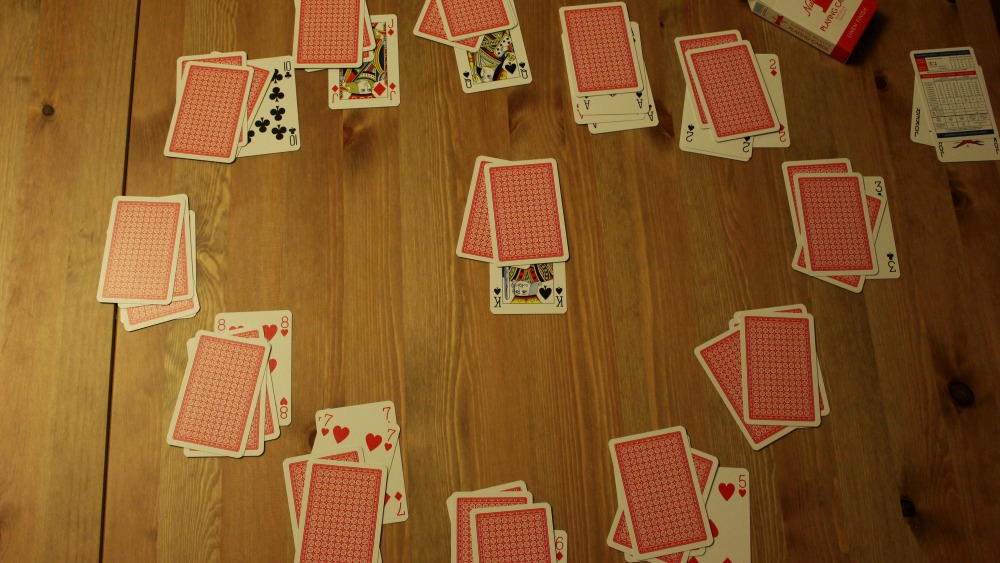
At primary school I learned 52 Card Pick Up. I sort of wish I was telling you this personal history face to face in case you don’t know what 52 Card Pick Up is. I hold up a pack of cards and ask “Do you want to know how to play 52 Card Pick Up?” and you nod, happy at the prospect of a new game. I then throw all the cards onto the floor and tell you “now pick them up”. Then I leave in a really cool way. I am also imagining myself wearing sunglasses and sipping a martini at this point, just so you know. I don’t think I wore sunglasses and sipped martinis as a primary school kid but you still felt like the cool one if you were the dropper and not the picker-upper. I mean, obviously it’s also a really obnoxious kid joke that makes someone feel silly, but it has that streak of childish idiocy, of just pushing stuff onto the floor that’s also really fun to do.
I now wonder whether my grandad knew about 52 Card Pick Up. Maybe I should have taught him. Oh goodness, I’m so looking forward to teaching my young relatives that one, then swanning off and leaving their parents to curse me for days.
By the time I reached the point in secondary school where cards became a “thing” we were into during lunch breaks, my grandad had died. But these were very much not his sort of games. Or maybe they had been way back before bridge club and long, long before I knew him. These were fast and sweary and sometimes painful games.
Raps was one. It was about drawing a card and the value and suit would determine your punishment. There was no scenario in which you wouldn’t be punished, it was just about the severity. I’m really hazy on the specifics because it rapidly declined in popularity after a sort of spurt of callous cruelty in our early teens. I think the number on the card determined the amount of times you would get hit and the suit revealed the type of blow. I think one suit meant slaps on the back of your hand, and another meant the deck of cards would be raked across your knuckles. It was the sort of game which was about getting to inflict more damage or being able to do so more efficiently than the other person.
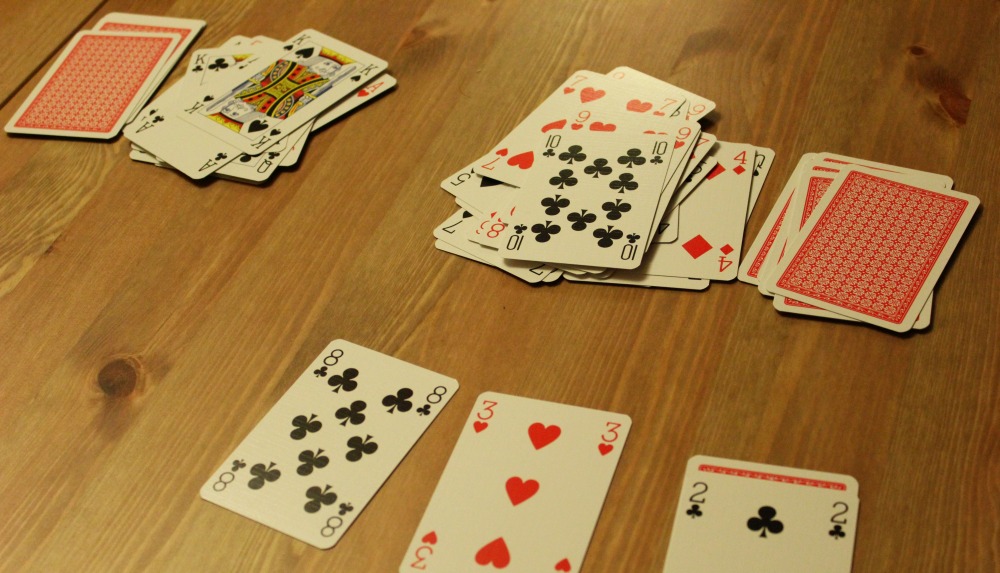
Shithead and Slam were the real lunchtime staples. Slam was a fast and furious game where you were trying to discard all of your cards as fast as possible by playing one higher or on lower value onto two discard piles then you’d slam your hand down on the smallest card pile and shout “SLAM” in order to win. In one version I think the other person could claim victory if they got their hand under yours, indicating that they’d slammed first and so you’d run the risk of that scraping or bending back of fingers and fingernails as you whacked at the deck. Cards would get bent and occasionally the loser would use bent cards as an excuse to take their cards and leave in a badly-concealed huff but most of the time it was also this exhilarating spectacle.
I remember that you’d focus on the cards in front of you to the point where all you were aware of was the patterns of numbers. There were rhythms within the game too, pleasing cascades of cards which you put down all in a rush and then a staccato interlude where you drew and drew again, waiting for the draw that might start the next cascade. It would then build to this tense peak where you’d be eying your opponent, flexing your hand over the draw deck, knowing this could be the trigger for the final slam but knowing the embarrassment if you slammed too early, misreading the value or gambling on what it might be. If you got the latter wrong you might forfeit the win because it was considered bad sportsmanship by some, but if you got it right you might still get suspicious looks. Were you really that fast or was it a lucky guess – no actual skill at all?. I think people from other schools referred to Slam as Speed and I privately thought that was a Really Lame.
Shithead wasn’t about winning, it was about not losing. It was similar to Slam in that it was another game about shedding your cards as fast as possible but there was less speed and a little more strategy. You got a hand you could look at, then a selection of cards on the desk – five face up and five face down, I think. You could swap the ones in your hand with the face up cards, trying to prepare a favourable late game by putting cards it was easier to play as face-ups.
Then it was a matter of turning over the top card from the draw pile and trying to play a card or cards one higher or one lower. I think in our version you could also play the same value because if four-of-a kind hit the pile all of the cards in the heap would be “burnt” and pushed out of play. Tens also let you burn the deck and twos could be played on top of any card. I think fives and eights did something special too in our version but I can’t for the life of me remember what. If you had nothing you could play you had to pick up the whole pile – sometimes dozens of cards – and try to get rid of them all over again.
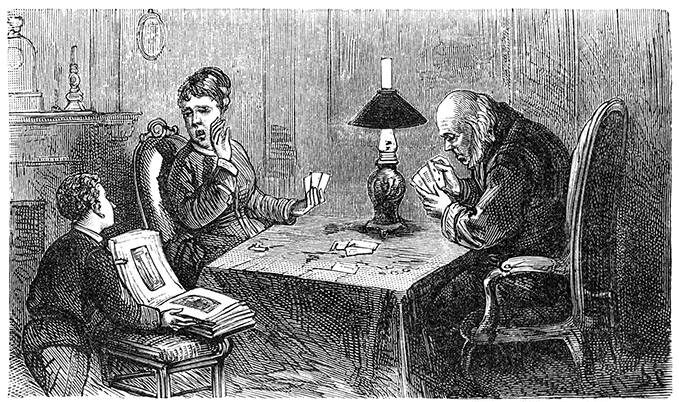
I really liked Shithead because of how the face up cards let you try and prepare the late game a bit. Them being face-up also meant you could try to play to your own advantage if you’d been forced to pick up a big heap because you’d try to play cards your opponent couldn’t respond to and force them to gradually pick up more instead of making progress. The face down cards were the problem. When you got rid of your hand and your face-up cards you’d need to pick a face-down card when your turn rolled around and just hope you’d be able to play it.If you couldn’t then you picked up the heap. By that point you might have a good idea of what those face-down cards could be but you had lost real control over them. You’d end up looking at the final face-down card and wondering if this would be your victory or would doom you to pick up some monstrously huge discard pile. Conversely, you could reach the point where your opponent only had that one card left and you’d know that if they had just the right card – a two or a ten, perhaps, then there was literally nothing you could do to win. You could try to use skill to get to that point, and skill to deal with the situation if the final card wasn’t what you or they needed, but in some ways a win was completely out of your control.
I wonder if that’s why Shithead wasn’t about winning exactly, it was about not being the one left holding cards. You didn’t win, you just didn’t lose and thus were not the Shithead. But the thing was, we only played it with two people usually so not losing ended up meaning “winning” anyway.
There was one final card game but it was more of a magic trick than anything else. (AN ILLUSION, MICHAEL) A close knit group of friends would send one of their group out of the classroom and invite someone to pick a card from the selection they dealt onto the table. You would pick silently, just pointing at the card, then step back. They would call their friend back in and she would feel the psychic energy of the cards, picking out your selection with complete accuracy.
The trick was related to how they invited the “psychic” back into the room. Nothing overt – something to do with the word order, or possibly the number of words used in the sentence which indicated which position the chosen card was in. It was a fun thing, though, watching them perform it well and maintain that it was absolutely to do with psychic powers.
What I remember about cards at secondary school was how the thoughtful trick-taking and parlour-friendly puzzling of my grandad’s card games gave way to energetic performance. Pretend psychics was perhaps the most obviously performance-based but with Slam you’d be eying each other across the desk, always standing, but with knees slightly bent, hovering over the cards and ready to do battle. People would spectate the scramble, maybe waiting for a turn, but sometimes just enjoying the scuffle. Shithead too attracted a small audience, but the slower pace meant you weren’t just watching the scramble; you also had time to think “Well, that’s not how I would have done it…”
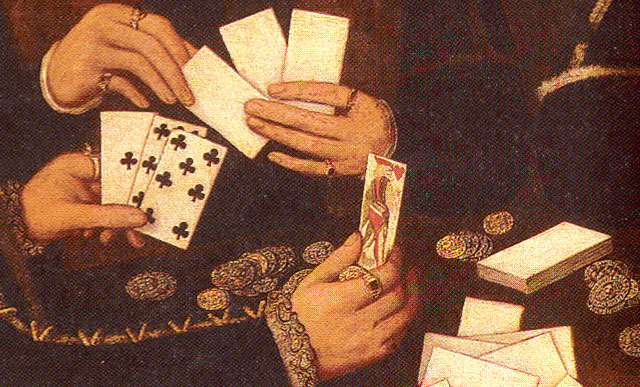
They were sort of strategic and definitely skill played a part in a win, but there was also the element of random chance which could help or hinder you. I feel like that was a key part of why those games stuck around as fun past times. The skill bits meant there was a vague hierarchy in amongst the wins and losses, but the random chance bits ensured no-one got too far ahead or too far behind. Other card games popped up every now and again, but they never seemed to spread across the year group in the same way – poker, for example. It was possible to be far, far better at poker than other people and for them to never want to play with you again. Blackjack fared better, but for me it always felt like one of those games that you’d use as social grout, filling in small gaps in your schedule, rather than a more substantial craze.
Leaving school and heading for my first attempt at university I joined a bridge club. I don’t remember why this happened. It’s entirely possible that they offered me wine at freshers’ fair. I mean, that is primarily how I came to be a member of the Wine Society when I had my second attempt at tertiary education.
I remember sitting in a room with a couple of other new people and trying to learn what bridge actually was but one had played it years previously (with her own grandfather, I think) and so just needed a refresher session, and another picked it up startlingly quickly. I guess I was having that experience I mentioned above when explaining why poker didn’t get traction at school. The others were good and I was not good yet so I kept needing to be partnered and reminded of rules and gosh it was stressful.
I don’t recall anything about bridge at this point. To be honest, and without going into too much detail, my first time at university was calamitous so bridge club wouldn’t really have been high on my list of “things to deal with urgently”. I do know bridge-sounding words. There’s “bid” and “North” and “dummy”, but I can’t deploy them in any meaningful way and the actual content of bridge club has stayed very much within bridge club (THE FIRST RULE OF BRIDGE CLUB). My grandad would have been so disappointed. Sorry grandad!
I think that’s when my regular contact with physical decks of traditional cards ceased. One would sometimes pop out of a Christmas cracker in miniature form, much to my parents’ horror, but they were too tiny to be pleasant to hold and near-impossible to shuffle. I could probably have used them to pretend to have psychic powers but that was about it.
I occasionally play card games on my computer. There’s the now-banished Spider Solitaire, which spun its sexy webs all over my evenings for about six months before being uninstalled forever. More recently there was the glorious Regency Solitaire – a kind of Jane Austen-style romance interspersed with solitaire challenges which you could make easier for yourself by upgrading your in-game ballroom.
I’ve started to crave a traditional pack of cards again, but not to pass the time on family visits, not to litter the floor with a dropped pack and a misplaced sense of coolness, not to slam my hand down on a high school desk as a showy tribute to the gods of random chance and not to lay the ghost of awful (but non-specific) experiences at bridge club to rest. Rather, it feels like a way of tapping into a vein of gaming which has lasted so long and which sees such varied and creative uses of 52 cards (and sometimes jokers). Some are authored and some seem to have come from everywhere and nowhere, with multiple names and house rules, which seep into your brain and you can’t remember not knowing them. That breadth and depth of possibility means it’s a very different experience to buying a boardgame. It’s closer to buying a box of lego, or maybe a notepad and pen. You haven’t bought a single game; you bought a toolkit for games.
Do you have a lovely card-playing memory? A favourite game? A precious deck?
Don’t be shy! Leave a comment.

